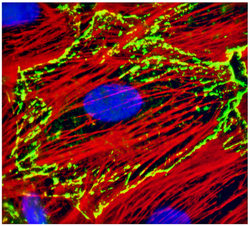
This figure shows the typical localization of alpha catenin (green) in epithelial cells, which line the cavities and surfaces of structures throughout the body. The nucleus is marked in blue.
Cara Gottardi, PhD, associate professor in medicine-pulmonary and critical care, has long been interested in the way cells stick together, and how that sticking conveys information to the nucleus.
Studying the major cell-cell adhesion structure in the human body – the cadherin/catenin system – Gottardi is hoping to learn more about why the outward facing cadherin proteins work solely to help join nearby cells together, while inward facing catenin proteins can also localize to the nucleus and impact gene expression.
Why might the cell employ catenins with this double duty?
“Our hypothesis is that relationships between catenins and the protein actin may hold the key,” Gottardi said.
Within a cell, actin plays a role similar to bones in a body, forming the scaffold on which the more fluid elements overlay. While the roles of actin in the cell cytoplasm have long been established – it is essential for cell mobility and muscle contraction during division – emerging evidence shows that it is also present in the nucleus, where it appears to contribute to various aspects of gene expression.
Gottardi’s lab has identified a catenin that can bind to actin, which seems to accumulate near the nucleus under certain conditions. Now, the lab is trying to figure out what role the protein may play in gene expression.

Cara Gottardi, PhD, associate professor in medicine-pulmonary, received a second-year supplemental Pilot Project grant from the Physical Sciences-Oncology Center for her work looking into the major cell-cell adhesion structure in the human body.
“We are trying to understand how alpha-catenin impacts gene expression by controlling the organization of nuclear actin within a cell,” said Gottardi, a member of the Robert H. Lurie Comprehensive Cancer Center. “The appeal of this model is that it may explain why alpha-catenin is used for both cell-cell cohesion and gene expression.”
By understanding alpha-catenin signaling and adhesion, scientists expect to learn more about the development of pulmonary fibrosis, scarring of the lung and cancer, since the protein appears to inhibit a molecule known to play a role in the disorders. If a loss of alpha-catenin function contributes to these diseases, scientists can begin to explore ways of increasing signaling capability.
Recently, Gottardi’s lab was one of two Northwestern research teams to receive a Pilot Project grant from the Physical Sciences-Oncology Center (PS-OC). This supplemental funding followed a PS-OC grant given last year in the amount of $100,000. Gottardi is working with Primal de Lanerolle, PhD, professor of physiology and biophysics at the University of Illinois at Chicago, whose earlier work inspired the collaborative effort.
Moving forward, she plans to work with Steven Kosak, PhD, assistant professor in cell and molecular biology, an expert on nuclear structure and chromosome territories, to determine whether nuclear alpha catenins impact chromosome territories, one of the major features of nuclear architecture, and whether they, too, may be related to differences in gene expression.






